In 2014, Michelle Carter texted her boyfriend Conrad Roy to kill himself just before his suicide. About three years later, she was sentenced to prison for involuntary manslaughter.
Michelle Carter and Conrad Roy always had a peculiar relationship. While the couple lived about an hour away from each other, the two teenagers only met in person a handful of times during their two-year romance. And so the pair’s communication was almost exclusively relegated to emails, phone calls, and now-infamous text messages.
Carter and Roy were just 15 and 16 years old, respectively, when they first met in Florida while vacationing with their families in 2012. By that point, Roy had long struggled with depression. And he thought that he had found a kindred spirit in Carter, who never discouraged him from expressing his true feelings.
But tragically, she soon encouraged him to pursue his worst.
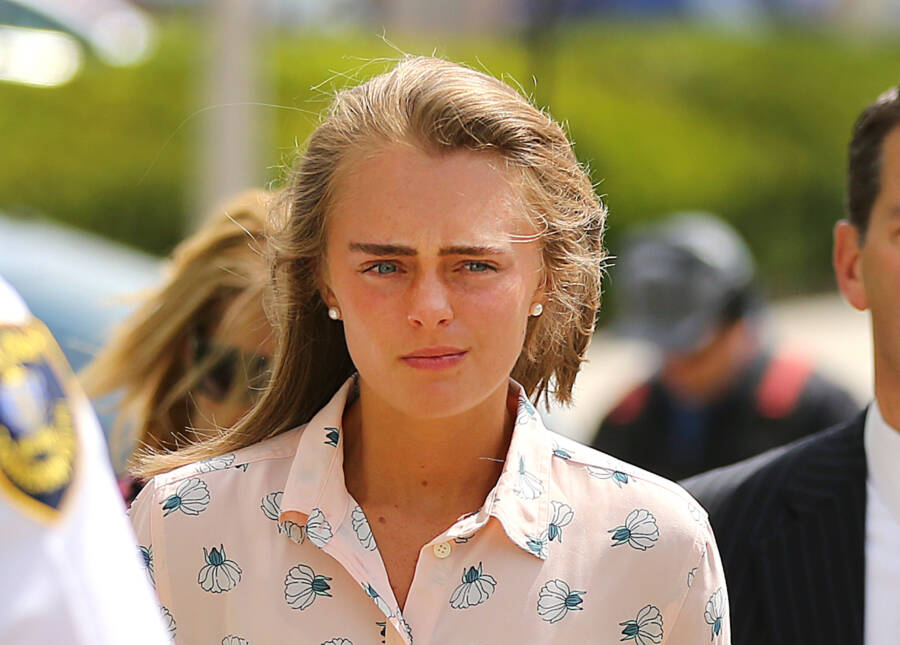
John Tlumacki/The Boston Globe/Getty ImagesMichelle Carter arrives at Taunton District Court to hear her verdict in the Conrad Roy case. June 16, 2017.
At first, Michelle Carter tried to help Roy with his mental health issues. After the couple returned to their respective homes in Massachusetts, they began communicating on a daily basis. But over time, Carter stopped helping Roy — and told him to kill himself over texts. She even instructed him how to fill a car with carbon monoxide, and promised he wouldn’t feel any pain.
And on July 13, 2014, police found Roy’s body in his pickup truck outside of a Kmart in Fairhaven. He had poisoned himself with carbon monoxide fumes. At first, it looked like a clear-cut suicide. But then, authorities looked at Roy’s phone and saw Carter’s texts, many of which urged him to kill himself. As dramatized in Hulu’s The Girl From Plainville, Carter was later convicted of involuntary manslaughter in 2017 — and served 11 months in prison.
This is the disturbing true story of Michelle Carter and Conrad Roy — and how the couple’s ill-fated relationship ended with Roy’s death.
The Lives Of Michelle Carter And Conrad Roy
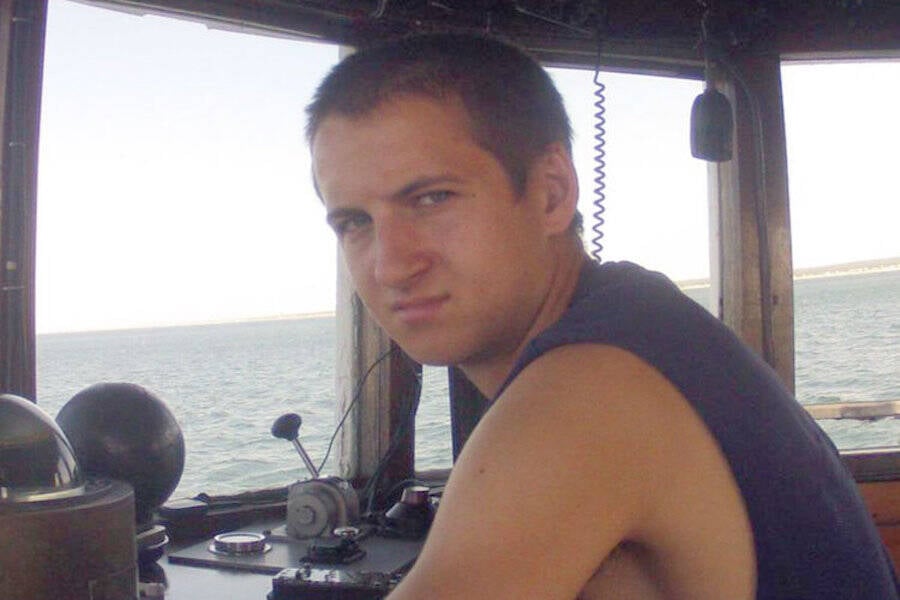
Conrad Roy/FacebookConrad Roy long struggled with severe depression and social anxiety before his suicide in 2014.
Michelle Carter was born on August 11, 1996, in Plainville, Massachusetts. On the surface, she appeared to be a normal American girl. Her father David was a sales manager at a local forklift supplier, while her mother Gail staged the interiors of homes for real estate agents hoping to sell them. However, Carter also struggled with mental health issues, most notably depression.
Her boyfriend’s upbringing appeared to have been similar. Born on September 12, 1995, in New Bedford, Conrad Roy III and his family moved to Mattapoisett when he was still a child. According to Oxygen, his mother Lynn described him as a “beautiful soul” who was happy when he was a youngster while his father Conrad Jr. recalled his love of the ocean.
But Roy struggled with severe depression and anxiety. It’s believed that these issues worsened during his parents’ divorce. At one point, Roy also claimed that his father was abusive toward him, as reported by Boston.com. While meeting Carter was one of the few buoys keeping Roy afloat, he tried to die by suicide in October 2012 by overdosing on acetaminophen.
Despite his struggles, he graduated from high school with a 3.88 GPA in June 2014. He also received his captain’s license from the Northeast Maritime Institute. But he’d tragically never find a career on the water as he’d hoped, as Carter began suggesting he kill himself over the next few weeks.
According to The Daily Beast, Fairhaven police later found this “constant encouragement to take his life” on Roy’s cellphone. But at the same time, Roy himself had also explained his dark feelings on video shortly before his death: “For me, social anxiety feels like it’s overwhelming my life. The first thing I want to do is be more proactive in a social environment… There’s people that love me. I have a great mom. Great dad, for the most part.”
Roy continued, “But I’m so depressed. I feel like I am differently wired from everyone else, like there’s something wrong with me. What I am doing is looking at myself so negatively. Look at myself, minuscule, little particle on the face of this earth. No good trash. Will never be successful.”
Tragically, he would die just a month later.
The Involuntary Manslaughter Of Conrad Roy
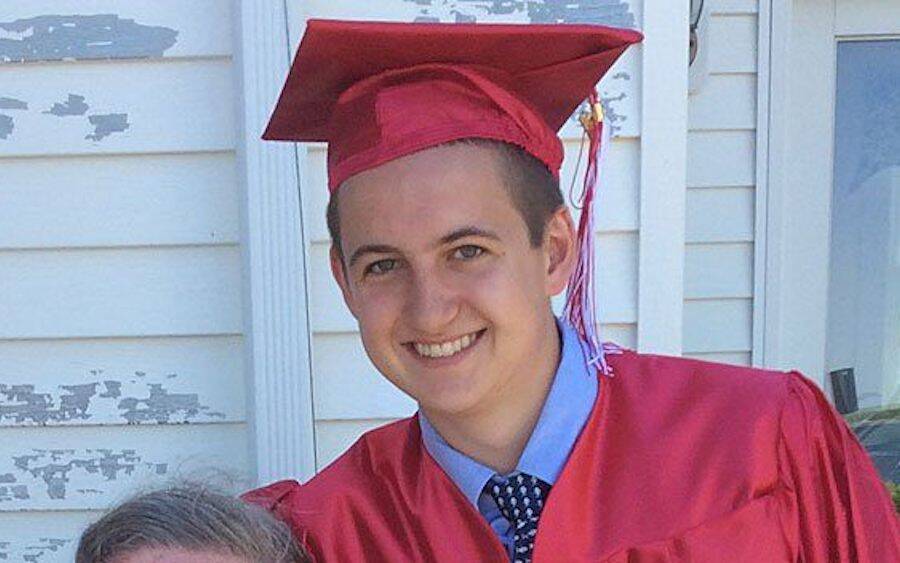
CNN/YouTubeRoy had graduated with a 3.88 GPA and gotten his captain’s license despite struggling with mental health issues.
Conrad Roy and Michelle Carter’s relationship initially appeared to have been healthy. But by July 6, 2014, 17-year-old Carter was actively encouraging 18-year-old Roy to kill himself. In one message in the days leading up to his death, she even instructed him how to use his car exhaust to die.
“If you emit 3200 ppm of it for five or ten minutes you will die within a half-hour,” Carter wrote to Roy. “You lose consciousness with no pain. You just fall asleep and die. You can also just take a hose and run that from the exhaust pipe to the rear window in your car and seal it with duct tape and shirts, so it can’t escape.”
In another message, Michelle Carter told Roy that his parents were almost certainly aware of how depressed he was and that they would accept his decision to end his own life. She claimed that there was nothing anyone could do to save him anymore and that his mother was mentally prepared for his death.
“Everyone will be sad for a while but they will get over it and move on,” she said. “They won’t be in depression. I won’t let that happen. They know how sad you are, and they know that you are doing this to be happy and I think they will understand and accept it. They will always carry you in their hearts.”
As the fateful day drew closer, Carter became more insistent that Roy kill himself, blaming him for “pushing it off” and reneging on his word to take his own life. She said that he would always feel suicidal “if you don’t take action.”
At some point after texting Carter, Conrad Roy drove to a local Kmart parking lot. He did as Carter had suggested and attached a hose from a portable generator so that it could flood the interior of his vehicle with carbon monoxide. Though he panicked and got out of the car, reconsidering his decision to end his life, he then contacted Carter, who urged him to get back in the truck.
Tragically, he did.
The Trial Of Michelle Carter
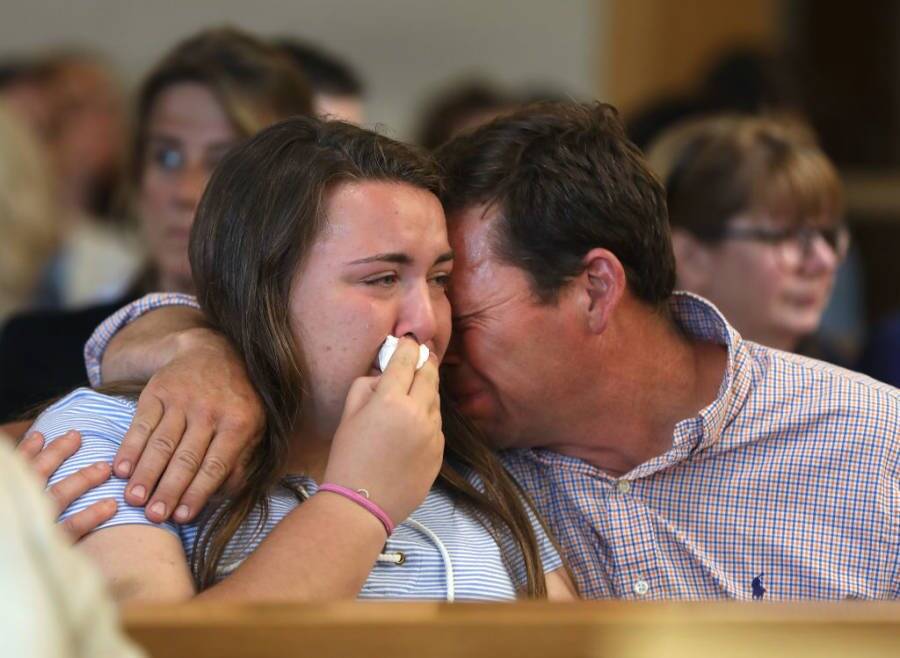
Pat Greenhouse/The Boston Globe/Getty ImagesConrad Roy Jr. comforting his daughter Camdyn during Michelle Carter’s trial before her sentencing.
“I could have stopped it,” Michelle Carter texted a friend after Roy’s body was discovered. “I was on the phone with him and he got out of the car because it was working and he got scared and I f*cking told him to get back in.”
But on the surface, Carter appeared to simply be grieving. Newly 18, she organized a “Homers for Conrad” softball game in Plainville in September. She also texted Roy’s phone on September 14th to say she had raised nearly $2,500 for the National Alliance for Mental Illness. But the facade wouldn’t last for long — as she was questioned by police in October.
By February 2015, Carter was indicted on a charge of involuntary manslaughter by a Bristol County Grand Jury. Though her attorney Joseph P. Cataldo asked the judge to dismiss the charge, this request was denied.
New Bedford Juvenile Court Judge Bettina Borders said that Carter’s texts to Roy and her instruction “to get back in the truck” were sufficient for probable cause. And after various unsuccessful defense motions, Carter’s trial began on June 6, 2017, according to South Coast Today. Since Carter had waived her right to a jury trial, the defense relied on convincing Taunton Juvenile Court Judge Lawrence Moniz of her innocence.
At the trial, Carter’s lawyer argued there was nothing she could have done to stop Roy’s suicide. But Judge Moniz decided that Carter had a “duty to alleviate the risk” — and that her failure “caused the death of Mr. Roy.”
The slew of troubling texts and calls from Carter was ultimately enough to convince the judge that Carter had lent Roy a proverbial hand in his suicide.
On June 16, 2017, 20-year-old Carter was found guilty of involuntary manslaughter. Though her lawyers tried to fight her conviction, it was upheld by the Supreme Judicial Court of Massachusetts in February 2019.
“After she convinced him to get back into the carbon monoxide filled truck, she did absolutely nothing to help him: she did not call for help or tell him to get out of the truck as she listened to him choke and die,” Justice Scott Kafker noted in the court’s opinion, according to The Associated Press.
Michelle Carter was initially sentenced to two and a half years in prison, but her sentence was reduced to 15 months. She ultimately served 11 months.
The Chaotic Aftermath Of The Case
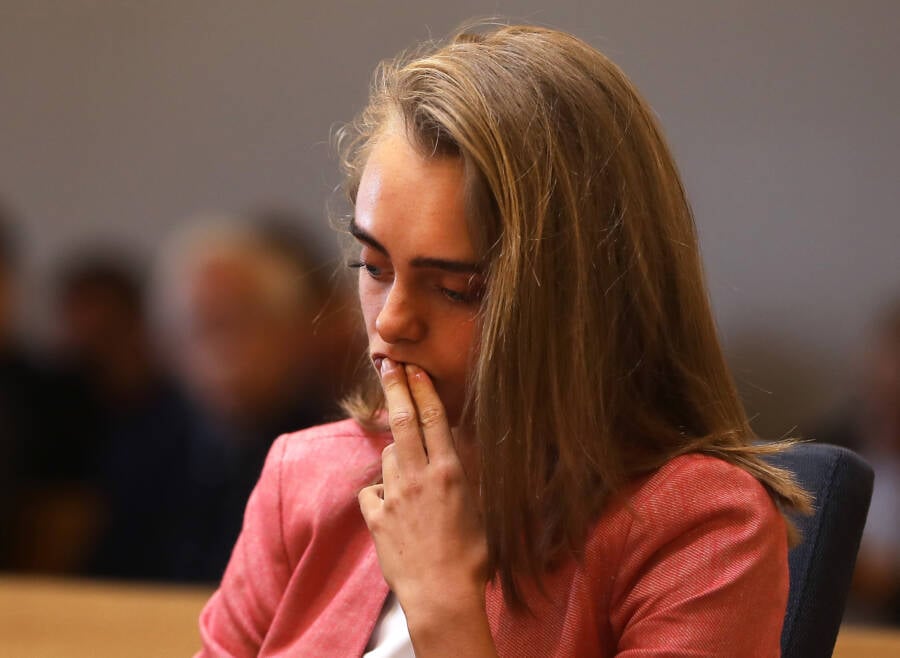
Pat Greenhouse/The Boston Globe/Getty ImagesMichelle Carter at her trial on June 6, 2017, in Taunton, Massachusetts.
While prosecutors had claimed that Michelle Carter wanted Conrad Roy to die so she could reap the popularity of victimhood online, the evidence was fairly flimsy. It relied mainly on one journalist’s mention of Carter’s obsession with the TV show Glee and the untimely death of its star Cory Monteith.
Carter had used similar language that Monteith’s real-life girlfriend, Lea Michele, used in the show while texting Roy. But according to psychiatrist Dr. Peter Breggin, Carter was not entirely at fault for behavior like this, especially since she also struggled with mental health issues.
She had previously been treated at a psychiatric hospital, and she was also known to have an eating disorder. Breggin also argued that Carter was “involuntarily intoxicated” by antidepressants, which she first started taking when she was 14. “She’s clearly out of her mind and so is he,” he stated.
As for Roy’s family, they remained in deep mourning throughout Michelle Carter’s trial as well as her jail sentence.
“It’s been four and a half years since Conrad passed. Our heart has been broken this whole time,” said Roy’s aunt, Becky Maki, after Michelle Carter began her jail sentence. “It’s been hard to live out the details of his death over and over again. It’s something that hasn’t left our mind… I hope that no one else ever has to feel this pain. His life mattered. It mattered to us and I think it mattered to a lot of people. Conrad, we love you.”
Though some believe that justice was served in this case — or that the sentence should have been longer — not everyone is enthused about the precedent that Michelle Carter’s conviction may have set.
Attorney Daniel N. Marx presented his case before the Massachusetts Supreme Court and argued that Michelle Carter’s ruling and sentence “stretches the law to assign blame for a tragedy that was not a crime,” as reported by UPI. His point was that sending somebody a text message, no matter how manipulative, should not equate to manslaughter.
“[It] has very troubling implications, for free speech, due process, and the exercise of prosecutorial discretion, that should concern us all,” he explained.
Though Michelle Carter has been a free woman since January 2020, she is still on probation and likely will be until 2025. And perhaps unsurprisingly, her case remains just as controversial as it was when the news first broke.
After reading about Michelle Carter and the troubling death of Conrad Roy, learn how photojournalist Kevin Carter took his own life after capturing the world’s tragedies. Then, discover the tragic story of Evelyn McHale and “the most beautiful suicide.”





